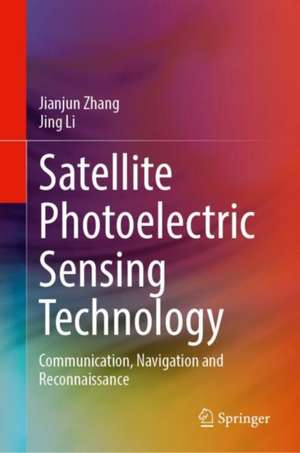Satellite Photoelectric Sensing Technology: Communication, Navigation and Reconnaissance
Autor Jianjun Zhang, Jing Lien Limba Engleză Hardback – dec 2021
The methods presented allow improvements in system performance in terms of receiving bandwidth, frequency-sensing accuracy, channel equalization, adjacent channel crosstalk, dynamic range, and complexity of the system structure. In addressing the difficulty of satellite spectrum control, including the issue of high-precision and real-time wide-spectrum sensing not being able to be obtained simultaneously, the book solves the problem of accurate and parallel-decomposition sensing technology using the dual-phase optical frequency comb. This method avoids the involvementof fine filtering and does not require fine alignment between the source and the filter but achieves high perceptual accuracy.
Satellite Photoelectric Sensing Technology explores the research background, significance, and current challenges associated with the technology, making it relevant and interesting to academics, practitioners, and postgraduate students in this field.
| Toate formatele și edițiile | Preț | Express |
|---|---|---|
| Paperback (1) | 938.83 lei 6-8 săpt. | |
| Springer International Publishing – 2 dec 2022 | 938.83 lei 6-8 săpt. | |
| Hardback (1) | 944.67 lei 3-5 săpt. | |
| Springer International Publishing – dec 2021 | 944.67 lei 3-5 săpt. |
Preț: 944.67 lei
Preț vechi: 1152.04 lei
-18% Nou
Puncte Express: 1417
Preț estimativ în valută:
180.81€ • 188.05$ • 151.52£
180.81€ • 188.05$ • 151.52£
Carte disponibilă
Livrare economică 20 februarie-06 martie
Preluare comenzi: 021 569.72.76
Specificații
ISBN-13: 9783030898427
ISBN-10: 3030898423
Ilustrații: XII, 160 p. 95 illus., 58 illus. in color.
Dimensiuni: 155 x 235 mm
Greutate: 0.42 kg
Ediția:1st ed. 2022
Editura: Springer International Publishing
Colecția Springer
Locul publicării:Cham, Switzerland
ISBN-10: 3030898423
Ilustrații: XII, 160 p. 95 illus., 58 illus. in color.
Dimensiuni: 155 x 235 mm
Greutate: 0.42 kg
Ediția:1st ed. 2022
Editura: Springer International Publishing
Colecția Springer
Locul publicării:Cham, Switzerland
Cuprins
Introduction.- Microwave Photonics.- Spacecraft Systems.- Overall Technology of Communication Satellite.- Satellite System Spectrum Sensing.- RF Channelization Technology.- The Basis of RF Photonic Channelization Technology.- Optical Frequency Comb Generation Mechanism and Its Application.- Channelized Receiving Technology Based on Optical Frequency Comb.- Channelized Link Distortion Compensation Based on Digital Signal Processing.
Notă biografică
Professor Jianjun Zhang received his Ph.D. degree from the Institute of Optoelectronics, Chinese Academy of Sciences in 2010. He is now Professor of Beijing Institute of Spacecraft System Engineering, China Academy of Space Technology. He is a member of numerous professional organisations, including being the Chairman of the "Space (Aerospace) Information Technology" Professional Committee of China Electronics Society. He is mainly engaged in satellite navigation system design, advanced spatial information system technology based on cognitive mechanism. He has published more than 50 papers in international journals and conferences, authorized more than 20 invention patents at home and abroad, and published 3 monographs. He won the third prize of National Defense Science and Technology Progress Award with the first completion person.
Associate Professor Jing Li received her Ph.D. degree from the Beijing Institute of Technology in 2011. She is currently an Associate Professor of the School of Automation, Beijing Institute of Technology. She is an expert member of the “Space Information Technology” Youth Committee of China Electronics Society, where the main research direction is robot environmental awareness, image detection and target tracking, multi-sensor information fusion. She has published 25 academic papers, authored one book "Image Detection and Target Tracking Technology", granted 7 national invention patents as the first author and the National Science and Technology Progress Award 2 (ranked 8th). The guided postgraduates have awarded the second prize of the 14th China Graduate Electronic Design Competition, the second prize of the first China-Russia (Industrial) Innovation Competition, and the second prize of the 14th National College Student Smart Car Competition.
Textul de pe ultima copertă
This book helps to solve the problems and challenges of satellite sensing in the current environment of increasing communications bandwidths and multiplicity of electromagnetic signals. It presents technology that makes full use of the broadband low-loss advantages of optoelectronic technology and research into new broadband radio-frequency channelization and receiving technology based on photoelectric sensing.
The methods presented allow improvements in system performance in terms of receiving bandwidth, frequency-sensing accuracy, channel equalization, adjacent channel crosstalk, dynamic range, and complexity of the system structure. In addressing the difficulty of satellite spectrum control, including the issue of high-precision and real-time wide-spectrum sensing not being able to be obtained simultaneously, the book solves the problem of accurate and parallel-decomposition sensing technology using the dual-phase optical frequency comb. This method avoids the involvement of fine filtering and does not require fine alignment between the source and the filter but achieves high perceptual accuracy.
Satellite Photoelectric Sensing Technology explores the research background, significance, and current challenges associated with the technology, making it relevant and interesting to academics, practitioners, and postgraduate students in this field.
The methods presented allow improvements in system performance in terms of receiving bandwidth, frequency-sensing accuracy, channel equalization, adjacent channel crosstalk, dynamic range, and complexity of the system structure. In addressing the difficulty of satellite spectrum control, including the issue of high-precision and real-time wide-spectrum sensing not being able to be obtained simultaneously, the book solves the problem of accurate and parallel-decomposition sensing technology using the dual-phase optical frequency comb. This method avoids the involvement of fine filtering and does not require fine alignment between the source and the filter but achieves high perceptual accuracy.
Satellite Photoelectric Sensing Technology explores the research background, significance, and current challenges associated with the technology, making it relevant and interesting to academics, practitioners, and postgraduate students in this field.
Caracteristici
Guides the reader through the background, challenges, and solutions of satellite sensing technologies Offers analysis of current algorithms used in satellite cognitive wireless communications Presents a methodology to increase performance via bandwidth reception and channel equalization
